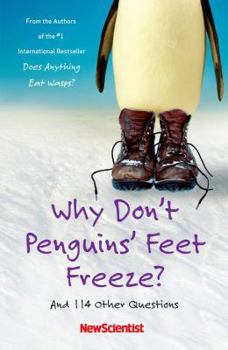Why Don't Penguins' Feet Freeze?: And 114 Other Questions
(Book #4 in the New Scientist: Last Word Series)
Select Format
Select Condition 
Book Overview
- What time is it at the North Pole? - What's the chemical formula for a human being? - Why do boomerangs come back? - Why do flying fish fly? - Do the living really outnumber the dead? - Why does... This description may be from another edition of this product.
Format:Paperback
Language:English
ISBN:1416541462
ISBN13:9781416541462
Release Date:June 2007
Publisher:Atria Books
Length:212 Pages
Weight:0.50 lbs.
Dimensions:0.7" x 6.6" x 8.5"
Customer Reviews
5 ratings
Fun look at science, volume two
Published by Thriftbooks.com User , 14 years ago
In 1994, the New Scientist started a column, The last word, devoted to everyday science questions asked by readers, with answers also provided by readers. Originally expected to survive for between one and five years, the column survived way beyond that and as far as I know, it is still going strong. Two books compiled from these columns didn't do much business but a third (Does anything eat wasps?) was a huge success. Its success prompted a subsequent volume (this one), that selects questions and answers from those two unsuccessful volumes and adds questions of more recent origin. A further volume, Do polar bears get lonely?, has also proved hugely successful. This book consists of nine chapters covering our bodies, feeling OK, plants and animals, food and drink, domestic science, our planet and universe, weird weather, troublesome transport and, for questions that don't fit easily into any of those categories, best of the rest. Note that these chapter headings are slightly different from the previous volume. Two new ones (feeling OK, food and drink) have been added while our planet and universe are combined in one chapter here. The question that gives the book its title provoked some very good answers explaining how penguins cope with life in the Antarctic, but there`s a more interesting (at least to me) penguin question elsewhere in the book. If polar bears and penguins swapped places, could they survive. The answer seems to be that polar bears would survive in the Antarctic but they would devastate the eco-system and penguins would be particularly vulnerable. Penguins might be capable of surviving in those parts of the Arctic where there are no polar bears, but there's another species that would make their life difficult - us. Attempts to establish northern penguin colonies have failed because people couldn't co-exist with them. Another question that particularly grabbed my attention was what the time is at the North pole. It sounds easy but of course it isn't, since the pole is on Earth's axis and therefore not in any particular time zone. A variety of answers are supplied, some serious, some not. One of the serious answers explains how it would be possible, using astronomy, to set up some kind of clock, summing that you didn't take a clock or watch with you. One of the less serious answers points out that Father Christmas lives there and, it being in no particular time zone, explains how he is able to deliver all his presents so quickly. Another answer suggests that the North Pole is the true spiritual home of all politicians, because the time can be whatever you want. The variety of the questions asked and the answers provided is incredible, although I confess that I wouldn't have actually considered asking most of these questions. While this book provides very informative answers, I suspect that you'll have most fun with it if you share it with family and friends.
Fun and Interesting
Published by Thriftbooks.com User , 15 years ago
Fun to read. It also caught the attention of my teenagers. It has many interesting facts that worked their way into meal time discussions and questions during a long road trip. It makes science into fun, and is a book equal to the Discovery and History Channels.
Think and have fun!
Published by Thriftbooks.com User , 16 years ago
Bought this after seeing it paired with PETER CAVE'S CAN A ROBOT BE HUMAN? 2 really good books geared to getting you thinking in an enjoyable way. Just don't accept things -we need the reason why! I do recommend buying them together as they use your brain in a different sort of way and Cave's book made me laugh as well!
A great casual read
Published by Thriftbooks.com User , 16 years ago
This is a great addition to New Scientist's set of scientific inquiry books. Full of answers to questions I've posed to myself while bored and some I wasn't creative enough to think of alone, I thoroughly enjoyed reading a few entries in the book each night before going to bed. The editors have done a good job of parsing through the debate surrounding some questions and provide mostly fair and complete answers. There is a thread of humor throughout the book that can almost go unnoticed, but you're bound to find yourself smiling sometimes whether you know it or not. I recommend this book to anyone with a sense of humor and inquiring mind.
Delightful Little Tidbits
Published by Thriftbooks.com User , 17 years ago
The New Scientist magazine started something bigger than they expected when they began the 'Last Word' column. It's a column where anything goes. Some of the questions covered: Why are left-handers at greater risk of accidental death? Should you pickle your conkers? (after all this is an English book) How do ants survive in the microwave? If you were in a free-falling elevator, would jumping before you hit the ground help? This book follows the wildly successful 'Does Anything Eat Wasps?' that was issued last year at just about Christmas time. It is, as the book says, 'science for the beople, by the people, a celebration of the trivial, idiosyncratic, baffling and strange.' Besides that, it's a great bathroom book.




